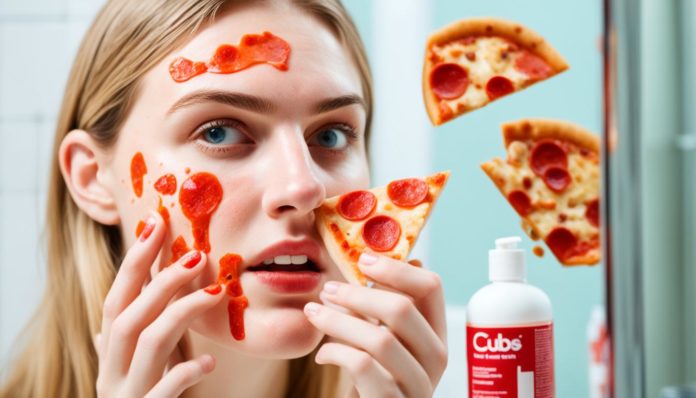Did you know about 85% of teens face acne issues? This fact highlights why understanding acne-causing habits is key. Many teens, without knowing, follow skincare routines that make acne worse. This guide will discuss five major mistakes in skincare routines. It will also offer tips for clearer skin, explaining how small changes can make a big difference.
Key Takeaways
- A poor diet significantly impacts teenage skin health.
- Excessive face touching can spread bacteria leading to more acne.
- Skipping moisturizer is a common skincare mistake.
- Over-washing the face can strip essential oils and worsen acne.
- Using harsh skincare products can irritate the skin and contribute to acne.
Poor Diet and Teen Acne
A poor diet can seriously affect teen acne. Knowing how food impacts your skin is key to managing breakouts. Many teens don’t see the link between what they eat and their skin health.
The Role of Sugar and Processed Foods
Eating too much sugar and processed foods is bad for your skin. These items can raise your blood sugar. This leads to more inflammation and oil, worsening acne. Candies, sodas, and fast food make keeping skin clear harder.
Importance of a Balanced Diet
A balanced diet is vital for healthy skin. It involves eating various nutrient-rich foods. Vitamins A, C, E, and Omega-3 fatty acids are great for the skin and can help with acne.
Foods That Promote Clear Skin
Some foods are great for keeping your skin clear. Here’s a list of skin-friendly foods to eat regularly:

- Fruits and Vegetables: Rich in vitamins and antioxidants that fight off inflammation.
- Whole Grains: Provide fiber and are less likely to spike blood sugar levels.
- Fatty Fish: High in Omega-3 fatty acids that can reduce inflammation.
- Nuts and Seeds: Packed with antioxidants and essential fatty acids.
- Probiotics: Found in yogurt and fermented foods, help maintain a healthy gut environment.
Choosing these healthier options can lead to good habits and less acne. Adding these foods to your diet is a step towards clearer skin.
Excessive Face Touching
Touching your face a lot is a bad habit, especially for teens with acne. This unconscious action can pass bacteria and oils from your hands to your face. This can make acne worse for teens. It’s very important to learn why this happens. You should also learn how to stop doing it to keep your skin clear.

How Touching Your Face Spreads Bacteria
Each time you touch your face, bacteria, dirt, and oils from your hands may end up on your skin. This can block pores and cause inflammation, which leads to acne. For teens, knowing that even a small touch can cause big acne problems is key.
“Touching your face can cause a buildup of bacteria, oil, and dirt on your skin, which exacerbates acne problems” – American Academy of Dermatology
- Transferring bacteria from objects (mobile phones, doorknobs).
- Enhancing oil production through frequent contact.
- Agitating existing pimples, leading to more acne.
Tips to Break the Habit
It’s hard to stop touching your face, but it’s necessary to prevent acne. Using certain strategies can improve skincare for teens. This can help stop acne from starting.
- Keep hands occupied: Do things to keep your hands busy, like doodling or using a stress ball.
- Regularly sanitize: Keep your hands clean with hand sanitizer. This helps stop bacteria from spreading.
- Set reminders: Put reminders where you can see them so you remember not to touch your face.
- Maintain clean surroundings: Clean items like your phone and pillowcase often. They touch your face a lot.
Skipping Moisturizer
Many teens think moisturizing will make acne worse. But, keeping skin hydrated is key for clear skin. Without enough moisture, your skin might make more oil, causing more breakouts.
Adding a moisturizer to your daily care makes a big difference. Choose non-comedogenic options, which won’t clog pores. This helps keep your skin balanced and may reduce acne.
Moisturizing is a healthy skincare habit that keeps your skin well-hydrated. It also fixes the skin barrier, important for acne-prone skin. This step is vital for better skin health and clarity.
Plus, moisturizers with hyaluronic acid or glycerin are great. They help your skin hold on to water. So, they’re a must-have in any teenage skin care routine, leaving skin soft and smooth.
Over-Washing the Face
Maintaining clear skin habits is crucial. However, washing your face too much can harm it. This can lead to dryness, irritation, and more acne due to stripping the skin of its natural oils. Learning the right way to clean your face is key for teenagers.
Why Over-Washing Can Be Harmful
Washing too often can damage the skin’s protective layer. It removes oils, causing your skin to make more oil. This can make acne worse. It’s all about understanding and following good skincare habits.
Proper Face Cleansing Techniques
Adopting the right cleansing habits is important for teen skincare. To wash your face well and gently, follow these steps:
- Wash twice daily: Once in the morning and again at night works well.
- Use lukewarm water: Too hot or too cold can upset your skin.
- Apply a gentle cleanser: Choose a soft formula made for teenagers.
- Pat dry: Be gentle. Pat your face dry with a clean towel.
Recommended Cleansers for Teens
Choosing the right face wash is essential for clear skin. Here’s a list of some top face cleansers for teens:
| Brand | Product | Features |
|---|---|---|
| Neutrogena | Oil-Free Acne Wash | It has salicylic acid to fight acne but won’t dry you out. |
| Cetaphil | Gentle Skin Cleanser | Works for all skin types and keeps your skin’s moisture. |
| La Roche-Posay | Toleriane Purifying Foaming Cleanser | It’s mild on sensitive skin and free from harsh ingredients. |
Having a good skincare routine can really make a difference. It helps you avoid bad habits and keep your skin clear and healthy.
Using Harsh Skincare Products
Many teens looking for clear skin end up choosing products that are too harsh. This leads to irritation, redness, and more breakouts. Knowing which products to avoid is key for a good teenage skin care routine.
For a teen skincare regimen, pick products labeled “gentle” or “non-comedogenic.” This means they’re less likely to clog pores or irritate. Avoid ingredients like alcohol, fragrances, and sulfates. Doing so can greatly enhance skin health and aid in acne prevention tips.
- Check product labels for non-comedogenic ingredients.
- Avoid products with alcohol, fragrances, and sulfates.
- Opt for skincare items labeled as gentle or hypoallergenic.
Using gentler skincare products can hugely improve your teenage skin care routine. It’s not about harsh products but finding what works for your skin.
Being consistent with your teen skincare routine is also crucial. Use mild cleansers, moisturizers, and acne-friendly treatments regularly. By following these acne prevention tips, you can keep your skin clear and healthy. This way, you avoid irritation and breakouts.
Teen Acne 5 Habits Worse
In managing teen acne, it’s key to know the harmful habits for acne. Poor eating habits and harsh skincare products are big factors. Here we list the Teen Acne 5 Habits Worse every teenager should avoid:
- Poor Diet: Eating lots of sugar and processed foods can cause acne. A good diet helps prevent acne.
- Excessive Face Touching: Touching your face often brings bacteria that can worsen acne. So, not touching your face helps keep it clear.
- Skipping Moisturizer: Not using moisturizer can dry out your skin. This might make your skin produce more oil, leading to acne.
- Over-Washing the Face: Washing your face too much removes natural oils. This can irritate your skin and increase acne. Cleaning your face right is important.
- Using Harsh Skincare Products: Strong chemicals in products can hurt your skin and make acne worse. Gentler products are better for healthy skin.
By fixing these five key issues, teenagers can really reduce their acne. Knowing and changing these harmful habits for acne leads to better acne prevention. And it helps make your skin healthier overall.
Not Changing Pillowcases Regularly
For teens fighting acne, clear skin habits are key. Alongside skincare routines, changing pillowcases often gets missed. But, it’s vital to switch them out to stop oils, bacteria, and dead skin buildup. This prevents worsening teen acne.
Importance of Clean Pillowcases
Keeping pillowcases clean is crucial for skin health. Each night, they collect products, sweat, and oil. Without regular washing, these substances can lead to blocked pores and acne. For teens with sensitive skin, clean pillowcases are a big part of their skincare.
How Often to Change Them
To help keep skin clear, pillowcases should be changed weekly. If your skin is very oily or you have bad acne, consider switching them every two or three days. Using silk or satin pillowcases is also smart. They don’t soak up as much moisture or product as cotton ones, helping your skin stay clean.
Lack of Proper Hydration
Staying hydrated is very important for clear skin. Yet, many teens don’t focus on it. Drinking enough water keeps your skin healthy and helps stop acne. It cleans out toxins that can cause pores to clog up.
Some people think only oily skin needs hydration. But all skin types can benefit from it. For dry skin, not enough water can make your skin produce more oil. This may lead to acne. Eating foods and drinking beverages high in water can help your skin care.
A balanced diet with plenty of water improves skin health. A study on the National Center for Biotechnology Information shows this. A diet low in glycemic load with the right vitamins and fatty acids helps fight acne.
But hydration isn’t just about water. Eating fruits and vegetables like cucumbers and watermelon also helps. These foods are full of water, vitamins, and antioxidants. They keep your skin healthy.
So, making sure to drink enough water is a great tip to prevent acne. Good hydration habits, a healthy diet, and lots of water can lead to clearer skin.
Failure to Use Sunscreen
Adding sunscreen to a teenage skin care routine is very important but often missed by many. Teens with acne-prone skin worry about clogged pores. Knowing how to choose and use sunscreen can really help keep skin healthy.
Benefits of Sunscreen for Acne-Prone Skin
Sunscreen protects acne-prone skin in many ways. It blocks harmful UV rays that can make acne worse and cause more damage over time. It also helps prevent acne scars from getting darker under the sun, leading to smoother skin.
Choosing the Right Sunscreen
Finding the right sunscreen is key to not clog pores or make acne worse. Look for non-comedogenic sunscreens meant for sensitive or acne-prone skin. Brands like Neutrogena, La Roche-Posay, and Cetaphil offer products that won’t cause breakouts. They fit well into a good skincare routine.
How to Apply Sunscreen Properly
How you put on sunscreen matters a lot. Use enough and spread it evenly on all skin that the sun can reach. Remember to reapply every two hours, or after swimming or sweating, to keep your skin protected all day.
| Brand | Features |
|---|---|
| Neutrogena | Non-comedogenic, lightweight, broad-spectrum SPF |
| La Roche-Posay | Suitable for sensitive skin, fragrance-free, broad-spectrum SPF |
| Cetaphil | Non-greasy, water-resistant, broad-spectrum SPF |
Conclusion
Understanding and avoiding the Teen Acne 5 Habits Worse is key for healthy skin. Eating too much sugar and junk food, not changing pillowcases often, and not drinking enough water can lead to more acne. Using sunscreen and cleaning your face gently can really help your skin.
Also, not using moisturizer and harsh skincare products can make acne worse. It’s important to touch your face less and eat foods that are good for your skin. Clear skin helps teenagers and adults feel better about themselves. This can boost self-confidence and improve how they interact with others.
By sticking to good skin care habits, you can have healthier skin and feel better overall. Start these habits early and keep them for life to take care of your skin. This way, you can handle teen acne well and feel more confident.
FAQ
How does a poor diet contribute to teen acne?
Eating lots of sugar and processed foods can make acne worse. These foods increase inflammation and hormones.
Eating healthy foods is key to managing and preventing acne.
Why is excessive face touching bad for acne?
Touching your face spreads bacteria and oil from hands to face. This can block pores and cause more acne.
Less face touching means fewer acne triggers.
Is it true that skipping moisturizer can worsen acne?
Yes, not using moisturizer can make acne problems worse. Keeping the skin hydrated is very important.
A non-comedogenic moisturizer helps to maintain balanced, breakout-free skin.
Can over-washing the face lead to more acne?
Washing too much removes natural oils, causing dryness and irritation. This can lead to more acne.
Gentle cleansing and avoiding too much washing are best for healthy skin.
What are the effects of using harsh skincare products on teenage skin?
Strong skincare products can make acne-prone skin worse, causing more breakouts. It’s good to use gentle, non-comedogenic products.
They support a healthy skin care routine for teens.
How often should pillowcases be changed to prevent acne?
Changing your pillowcase at least once a week is advised. This prevents oil and bacteria buildup that causes acne.
What role does proper hydration play in skin health?
Staying hydrated is key for a healthy skin. It keeps the skin’s balance and reduces oil.
Drinking lots of water helps control acne outbreaks and keep the skin clear.
Why is sunscreen important for acne-prone skin?
Sunscreen helps protect skin from the sun’s harmful rays, which can make acne worse and cause scarring.
Use a sunscreen made for acne-prone skin to prevent pore clogging.


